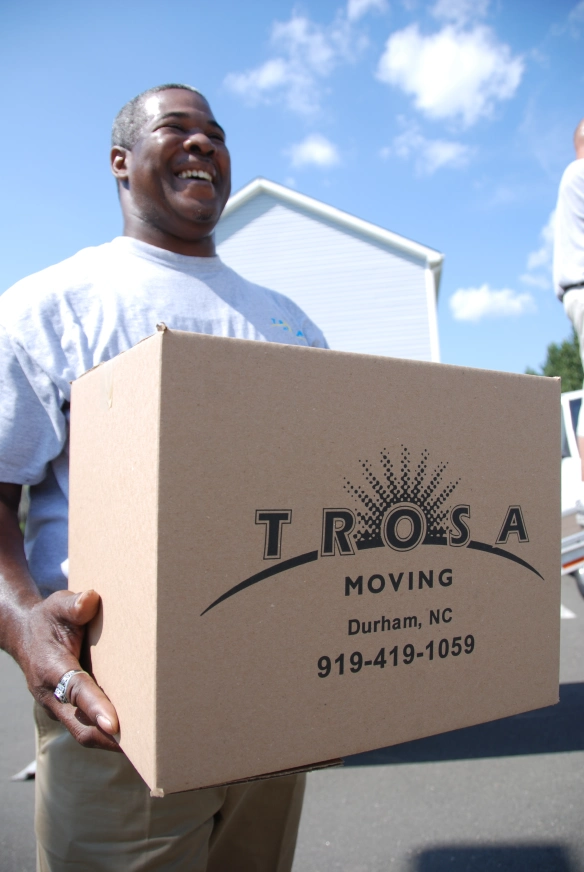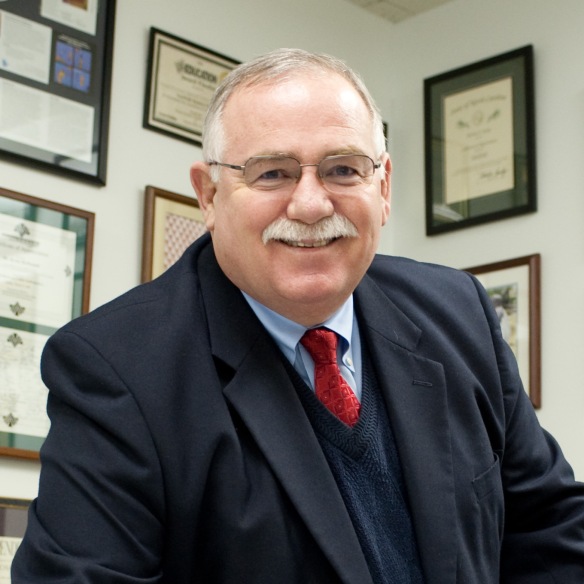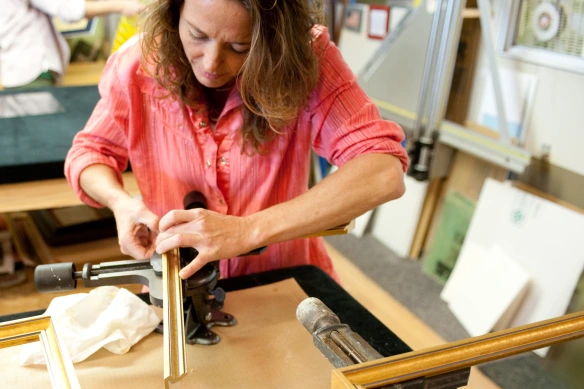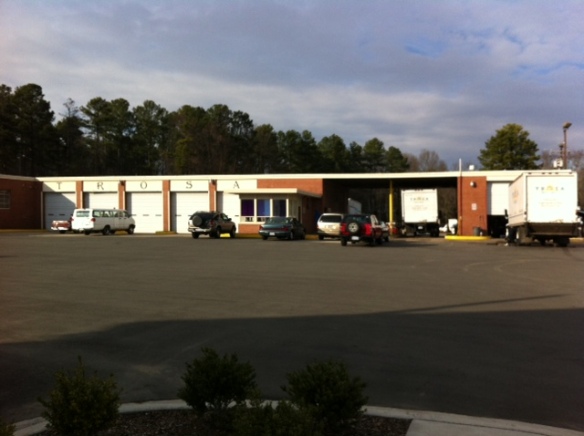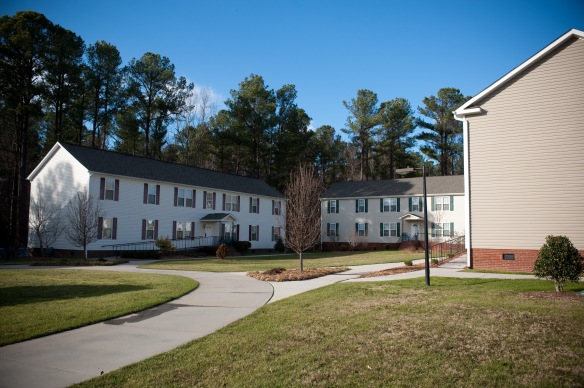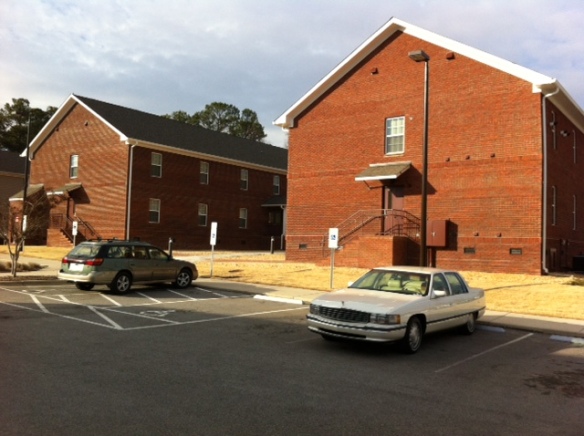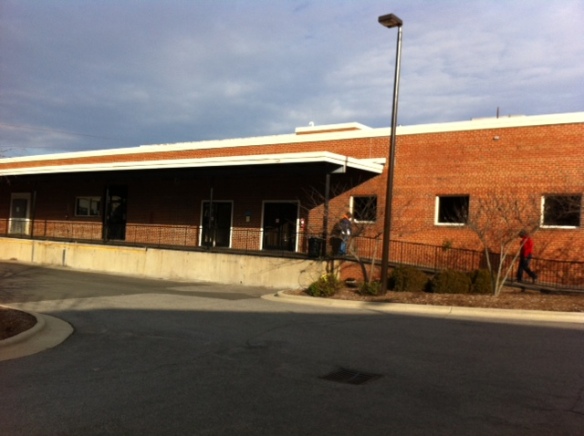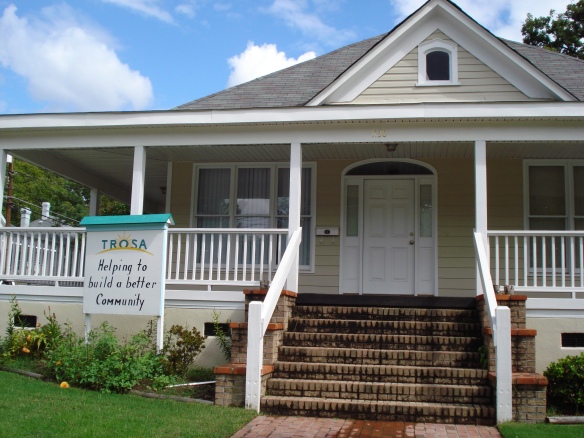If you live in the Triangle, especially in Durham, you’ve probably heard of TROSA (Triangle Residential Options for Substance Abusers). The organization partially supports itself through its various businesses – moving, landscaping, a used furniture store, a frame shop, and Christmas tree lots.
I was lucky to hear CEO Kevin McDonald speak fifteen years ago at an event in Chapel Hill when I was just starting my first job, fresh out of graduate school. A dynamic and passionate speaker, Kevin told the audience how he fought his own addiction, and used his recovery to inspire, lead, and innovate at TROSA. I was extremely drawn to his missionary zeal, but the timing was wrong. I made a mental note to reconnect later on.
Fast-forward fifteen years. At the Veteran’s Annual Stand-Down in May 2012, Annemarie Maiorano (Director of Housing, Wake County Human Services) and I were brainstorming employment opportunities for homeless men at the Wilmington Street Men’s Shelter. She suggested I connect with TROSA to see if I can learn from its profit-making ventures – maybe even replicate one of them in Wake County. Kevin spoke at UNC in November, and I asked him if I could visit TROSA. He graciously agreed.
On December 7th, 2012, Mike Balsamo gave me the tour of the TROSA facility, after a brief video introduction. I thought I knew all about TROSA – but nothing could prepare me for the scale, scope, and depth of this organization’s work. It’s stunning, humbling, and awe-inspiring to see the human transformations that take place here on a day-to-day basis.
During the tour, we visited an office where residents call companies to solicit in-kind donations. Residents stood up, introduced themselves, and described the addiction journey that brought them to TROSA. As I was doing research on homelessness, I asked them some specific questions on how to approach homeless individuals at the shelter with substance abuse issues. One of the residents said, “I lived in the Wilmington Street shelter so I know exactly whom you are talking about. Don’t push too hard, just let them know what’s available.” Another disagreed, “I would have never taken the initiative without a little push, and TROSA is the best thing that happened to me.” A graduate of the TROSA program happened to walk in and she shared how she went from being homeless to a contributing member of society. “I have a job at a hotel and my kids look up to me… they look up to me now…” Another resident whispered, “I hope one day my kids will look up to me too.” Tears welled up in his eyes. The others gently reassured him.
TROSA is not an easy experience but you walk the road from addiction to recovery with those who understand what you’re going through. Addiction is treated as a disease and psychiatrists apply an evidence-based clinical approach to each individual’s unique situation. In TROSA’s model, the community plays a huge part in the recovery process. Mike Balsamo described all-day and all-night sessions where groups of TROSA residents focus on one person and help him or her get to the root causes of addiction. This could include identifying personality traits and emotional trauma. This community helps you see the self-destructive behaviors that trigger addiction, and has the credibility to call them out — something your friends and family can’t — because they haven’t walked in your shoes. Sympathy doesn’t compare to empathy.
I’m an unabashed admirer of leaders like Kevin – it takes a force of nature like him to get things off the ground against great odds. He reminds me of an Indian humanitarian I was lucky to meet, study, and write a book about — Baba Amte, who did amazing work with leprosy patients. But what struck me during the tour were the photos of the entire TROSA team on the conference room wall. You’ll see it too when you come for a tour: it takes a heck of a leadership team and hardworking staff to pull off a vision so expansive. I saw their work manifested in the way the organization operates.
Many people admire the fact that TROSA generates half its operating budget from its various businesses. I have to admit, that’s what I saw from the outside too. But when you walk the halls and meet the residents, you realize the skills, self-confidence, work experience they acquire are equally impressive. TROSA graduates leave with a set of marketable skills and a proven work ethic.
After the tour, I spent an hour or so with Kevin and Mike, and it became clear to me that applying TROSA’s business model to help the homeless men and women who live in Wake County shelters would be challenging. Kevin gave me examples of others he has helped in the past, and openly shared his perspective about why those ventures failed. Because of the transient nature of the homeless population, it is very difficult to run a professional business. Though it was not exactly what I hoped to hear, it was critical to know this upfront.
After meeting with Kevin, I realized that in order to build a social enterprise that has a chance of succeeding, it may be wise to start with graduates of substance abuse programs (like TROSA and The Healing Place) and/or foster kids aging out of the system. Both these groups are likely to be ready for employment. We may also be able to employ veterans who are at risk for homelessness, and some of the homeless families that human services agencies feel are ready for work.
In preparing for my visit to TROSA, I spent a lot of time researching the organization. Many academics have written case studies and articles. One particularly caught my eye because it explored why other social entrepreneurial organizations had replicated and spread, but TROSA had not. The professors who wrote the journal article are associated with Duke University’s Center for the Advancement of Social Entrepreneurship (CASE). I’ve thought a lot about replication and TROSA since my meeting exactly a month ago with Kevin. I studied the Delancey Street Foundation’s replication strategy.
While TROSA could replicate or franchise its model, based on Kevin’s advice, it may be more useful to first create an institutional memory by recording the collective wisdom of its most experienced leaders.
This TROSA ‘insider’s guide’ would insure its long-term survival beyond the lifetimes of the current leadership team. It could later be used as a kernel for an online university where academics, researchers, substance abuse professionals, social entrepreneurs, impact investors, and philanthropists gather and learn from TROSA’s real-world laboratory. I see a wealthy person who has experienced the ravages of addiction funding such a resource as a legacy gift. It would be a no-brainer because TROSA knows how to deliver impact. Reality isn’t pretty – it’s full of compromises and fixes. But that’s also what makes the lessons powerful and invaluable. Ivory-tower strategic plans don’t always work in the real world. In fact, TROSA’s journey defies all the odds and breaks many business- planning rules (for example, it was severely under-capitalized to begin with).
What’s not to like about TROSA? For one thing, because much of the food is donated, you’ll see unhealthy donuts, cakes, cupcakes, and other sinful treats all over the place. But as I watched the kids from a nearby school shoot hoops in TROSA’s indoor gym, and noticed a couple of exercise machines in the corner, I realized the sugary snacks on site was probably not the whole picture – I wonder what they serve at meal times?
Some may find the discipline at TROSA too strict. As Martha Quillin writes in her recent N&O piece, “At first, many TROSA residents balk at all the rules, which govern everything. Keep your shoes lined up under your bed. Make your bed. Walk in pairs when you’re on campus. Be on time, every time.”
I’ve also heard that some find the two-year program too long. I personally could not imagine being separated from young children for an extended period of time. As Mike Balsamo explained, “Residents can communicate with their families by mail after thirty days and by phone at ninety days. There is one family day visit (held every October) that falls somewhere in a resident’s first year and this is the first face-to-face visit. At one year, a resident’s family can come spend one Sunday afternoon on campus. At 14, 16, 18, and 21 months they get to go home for a visit but they do have to take one of their peers along with them.”
Not seeing your child for ninety days sounds harsh, but as one of TROSA’s current residents remarked, “I was in prison before I came to TROSA. I spent two years away from my baby while incarcerated. It may sound cruel but there is a reason for this requirement. Healing from substance abuse requires us to be separated from the triggers that caused us to be in this situation in the first place – and family is one of those triggers.”
I was lucky I met Kevin at a local event and he took the time to help me. If we could share TROSA’s knowledge online, someone in the Philippines could learn how to set up a substance abuse program, or a social entrepreneur in New Orleans could replicate TROSA’s landscaping business to help ex-prisoners or foster care youth ageing out of the system. The possibilities are endless.
I see videos, case studies, ‘what not to do’, ‘pitfalls to avoid’, how-to guides and much more as part of this online resource. Later, it may be feasible to include some hands-on practical training on-site for serious social entrepreneurs: an internship that is a win-win for both sides. To replicate TROSA’s model in its entirety, you have to walk the halls, do the work, and immerse yourself in the culture. I liken it to the way I learned French: after four years of academic study, I couldn’t string one cogent sentence together though I knew all the grammar and a lot of vocabulary. After only three weeks of immersion in Chambery, France in the home of a French family and 24/7 with my French friends, my spoken French improved dramatically – I was dreaming in French!
TROSA could charge students for this education. In my view, this type of hands-on “immersion” apprenticeship is as valuable as a graduate education in social entrepreneurship at a leading university – if not more. My Northwestern graduate education cost me over $20,000 a year (plus room and board). Why can’t TROSA earn the same for imparting its wisdom to students?
Running TROSA is more complex than most people realize – a bit like a duck – calm on the surface but paddling like the dickens underneath (paraphrasing actor Michael Caine). Till you come here, you won’t get a sense of what makes TROSA special. Its internal culture is so unique that in many ways, it is the driving force behind the organization – and a key reason for its success. Yes, of course, the ‘each one, teach one’ philosophy is part of it, but it’s more than that. You can tell that TROSA represents a fresh start, a sense of hope, and a refuge, all wrapped into one.
If you have pre-teen or teenage kids, a visit to TROSA could actually serve as the best prevention strategy against addiction. In fact, when your friends and family come to the area, show them the Duke Chapel and the Gardens, but also consider scheduling a TROSA tour. Years later, your guests may or may not remember the chapel or the gardens, but they will remember TROSA.
TROSA earns half its revenues through its business ventures, holds its residents accountable to the highest standards, and teaches a superior work ethic. It helps addicts become functioning and productive members of society. It is probably one of the few impact nonprofits that both fiscal conservatives and liberal democrats find appealing – and everyone in between. Now that’s pretty extraordinary.
January 25, 2013

